|
|
|
Sort Order |
|
|
|
Items / Page
|
|
|
|
|
|
|
| Srl | Item |
| 1 |
ID:
132308
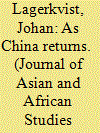

|
|
|
|
|
| Publication |
2014.
|
| Summary/Abstract |
This article investigates how perceptions of China in Mozambican civil society are affected by entrepreneurial activity and bilateral cooperation between China and Mozambique - real, imagined, visible and legal as well as clandestine and illegal in the agricultural and forestry sectors. The research problem concerns how discourse on Chinese investors is formed in Mozambique. Two questions are posed. How does Mozambican civil society perceive their room to maneuver at a time of Chinese growing economic interest and 'return' to Africa? What views exist on the policy space for the national government? Using qualitative ethnographic interviews to answer these overarching questions about expanding/contracting maneuvering space, this article explains how Mozambique's largest social group - peasants - the National Association of Small Farmers (UNAC) and other societal actors perceive Chinese investors. Informed by theoretical debates on civil society, the article argues that coinciding with China's large-scale return to Africa, an already tense dynamic between civil society and the state is picking up speed. It is argued that this phenomenon is likely to have more to do with African governments accruing more power and policy space than through direct impact of Chinese economic activity on African social life. However, to avoid negative discourse formation, China and host governments need to become more open on and transparent about bilateral agreements.
|
|
|
|
|
|
|
|
|
|
|
|
|
|
|
|
| 2 |
ID:
132312
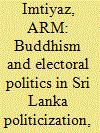

|
|
|
|
|
| Publication |
2014.
|
| Summary/Abstract |
Organized religions often play a significant role in the political affairs of any country when political actors carefully employ them to pursue power. Buddhism is the major religion on the island of Sri Lanka, and often it becomes a powerful symbol for Sinhala-Buddhist politicians. This study examines the interaction between Buddhism and politics in Sri Lanka, and will attempt to examine the religious factors in Sri Lanka's ethnic conflict between the two nations; namely, Tamil and Sinhala. It will examine how the politicization of Buddhism helped Sinhala political elites and leaders in their quest for power, reinforcing religious and ethnic tensions, and finally will discuss some solutions to de-religionize the state structure to help Sri Lanka enjoy the fruits of modernization and democracy.
|
|
|
|
|
|
|
|
|
|
|
|
|
|
|
|
| 3 |
ID:
132314
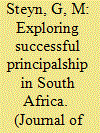

|
|
|
|
|
| Publication |
2014.
|
| Summary/Abstract |
In line with international studies, this study reports in a case study how a South African school principal succeeded in sustaining leadership despite the challenges South African schools experience, and how the principal's leadership practice related to core leadership practices required for a school principal to be successful. Data were collected by means of open-ended interviews with the principal and his staff. The following main themes were constructed: (1) Personal traits; (2) Leadership style; and (3) Ability to sustain and improve development. Secondary empirical data from previous studies in the school supported the findings in this study. The findings of this case study have implications for South African school principals: (1) principals need to be fully committed to improve the quality of learning in schools; (2) they need to be skilful in effectively using available resources; (3) successful principalship develops over time and requires a clear vision, optimism, high performance expectations and acting with care and integrity to nurture trust among role players
|
|
|
|
|
|
|
|
|
|
|
|
|
|
|
|
| 4 |
ID:
132313
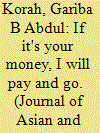

|
|
|
|
|
| Publication |
2014.
|
| Summary/Abstract |
Like many ethnic groups in sub-Saharan Africa, the Dagaaba of northwest (now Upper West region) Ghana have regarded, and for the most part, continue to regard the payment of the brideprice as the cornerstone upon which marriage is built - without it a marriage contract is not considered legal. Since the 1980s, however, the significance or essence of the payment has been contested and challenged by many Dagaaba. While some (young men) argue for a reform of the payment, others (young women) argue that the practice should be abolished altogether. Yet a third group (mostly elders) believes that brideprice payment is a "tradition" passed down over generations that should be maintained. This article examines the origins and historical significance of brideprice payments, and how views about these payments have changed over time among the Dagaaba - from those born near the close of the last century, to those of marriageable age now. The goal of this examination is to contribute to the ongoing discussion among African scholars and governments on the importance of maintaining certain aspects of their cultural heritage.
|
|
|
|
|
|
|
|
|
|
|
|
|
|
|
|
| 5 |
ID:
132309
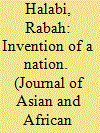

|
|
|
|
|
| Publication |
2014.
|
| Summary/Abstract |
Ethnic and national identities are shaped and evolve in the context of complex negotiations sustained among multiple players, each with its own and often contradicting interests. This study focuses on one unique cultural group, the Druze in Israel, and examines a multifaceted identity constructed as a direct result of policies and expectations of members and institutions of majority groups. My aim is to explore how this identity is defined within the complex intergroup context, the various components and their inter-relations (congruent or conflictual), and the way its boundaries are shaped through interaction with other identities in Israel. The analysis of the interviews conducted with 50 Druze university students in Israel yielded three major content categories: 'Druze by blood;' 'Arab, but less so;' and 'Being Israeli.' The Druze identity is constructed in primordialist terms, and a central role is assigned to the belief in reincarnation. The Arab identity is categorized primarily as a national one, and it is strongly affected by the negative attitude of Arabs toward the service of the Druze in the Israeli army. Three major aspects emerged in relation to the Israeli identity of the Druze: the fact of their being citizens of the State of Israel, the attitude of the state and of Jews toward them, and the army service. Our study portrays a highly complex and problematic constellation of group identities, shaped as a delicate adaptation to the unique position of a group subject to multiple political forces in the past and present.
|
|
|
|
|
|
|
|
|
|
|
|
|
|
|
|
| 6 |
ID:
132311
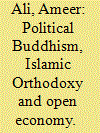

|
|
|
|
|
| Publication |
2014.
|
| Summary/Abstract |
After nearly a millennium of uninterrupted harmony between the Sinhalese and Muslims in Sri Lanka, economic and ethno-religious developments after the 1970s have created an atmosphere of communal tension between the two groups. While a new wave of political Buddhism with its militant offshoot amongst the Sinhalese and the growth of a rigid Islamic orthodoxy amongst the Muslims have provided the ethno-religious dimension to this tension, the post-1977 open economy has added an economic dimension to it. The interplay of this toxic triad is a reminder of a similar scenario that produced the first Sinhalese-Muslim racial riots in the country in 1915. Unlike the first, which occurred in the colonial context, the current one, which if not arrested, will not only jeopardize Sinhalese-Muslim harmony but also will result in adverse consequences in Sri Lanka's relations with Muslim countries.
|
|
|
|
|
|
|
|
|
|
|
|
|
|
|
|
| 7 |
ID:
132315
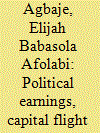

|
|
|
|
|
| Publication |
2014.
|
| Summary/Abstract |
Politicking ranks the most lucrative preoccupation in sub-Sahara Africa generally, and Nigeria specifically. This logically derives from the central role of the state in socioeconomic processes. The public sector, by its size and share of the communal wealth, remains the most potent means of empowering nations for development. Reviewing 12 years of democratic rule in Nigeria, this paper examines the relationship between political earnings, capital flights and economic development with disappointing findings that the economic mix of political earnings constitutes a cog rather than being a catalyst of development in Nigeria. Identifying constitutional, societal and other systemic disincentives as major inhibitive factors, the paper advance measures by which local reinvestment of political earnings could be encouraged to contribute to current efforts at accelerated national development
|
|
|
|
|
|
|
|
|
|
|
|
|
|
|
|
| 8 |
ID:
132310
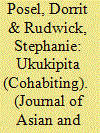

|
|
|
|
|
| Publication |
2014.
|
| Summary/Abstract |
In South Africa non-marital cohabitation rates among Africans remain low, and particularly in the context of very low marriage rates. Through qualitative interviews with urban isiZulu-speakers we explore attitudes towards ukukipita (cohabiting) in contemporary Zulu society. These in-depth interviews capture the meanings associated with non-marital cohabitation and they provide insights into why cohabitation is widely viewed as unacceptable in Zulu society unless the man has initiated ilobolo (bridewealth) negotiations and concrete marriage plans are in place. Cohabitation without ilobolo payment is widely interpreted as akin to behaving disrespectfully towards Zulu culture and tradition, the immediate family and the Zulu community more broadly.
|
|
|
|
|
|
|
|
|
|
|
|
|
|
|
|
|
|
|
|
|